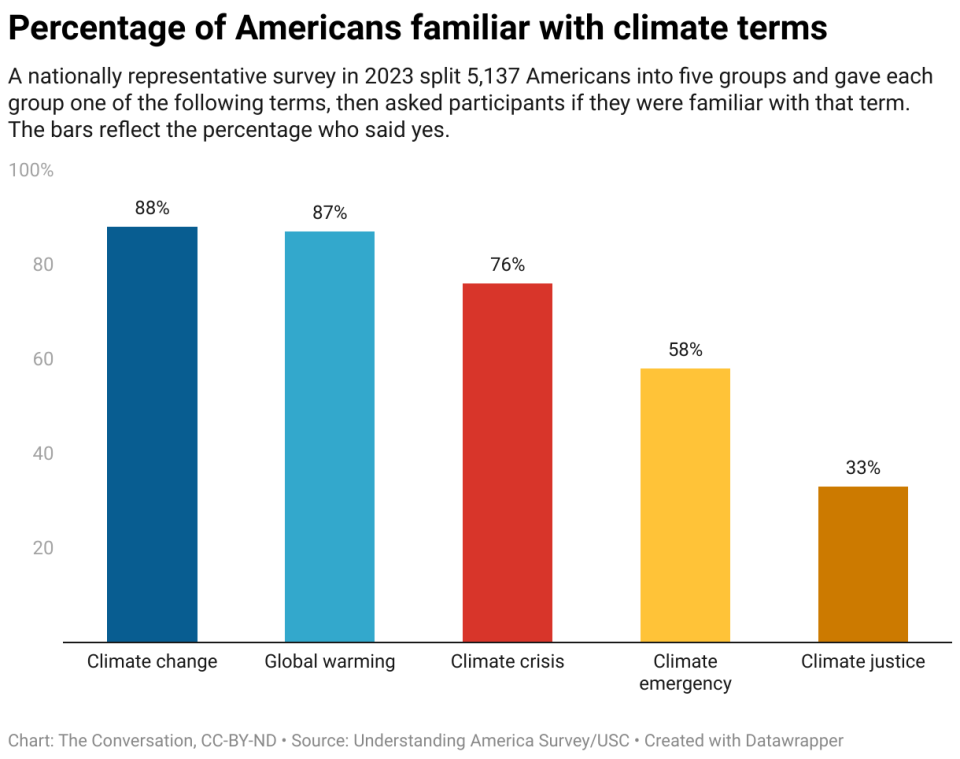You’ve probably heard phrases like “climate crisis,” “climate emergency,” or “climate justice” more often lately as people try to explain the urgent risks and consequences of climate change. The danger is real, but is using this language really convincing?
A recent survey of 5,137 Americans, a nationally representative sample, found that Americans are more familiar with and concerned about climate change and global warming than they are about the climate crisis, climate emergency, or climate justice.
We also found no evidence that alternative terms increased people’s sense of urgency, willingness to support climate-friendly policies, or willingness to take action.
Familiar terms—climate change and global warming—performed as well as, and sometimes better than, climate crisis and climate emergency in generating concern, perceived urgency, and a desire to act. Climate justice tended to perform consistently worse, likely in part because it was the least well-known. Responses were similar among Republicans, Democrats, and independents.
Just keep it simple
In our work as research psychologists, we have examined how Americans respond to the ways climate change is communicated and have uncovered the need to use understandable language.
For example, interviewees for a study published in 2021 felt that climate experts were talking over their heads with terms like “adaptation,” “mitigation,” “sustainability,” and “carbon dioxide removal.” Instead, they wanted experts to use more familiar terms.

This prompted us to write a quick guide to climate jargon, published on The Conversation. Using everyday language makes information easier to understand, and even highly educated people tend to prefer it.
However, experts often use complex jargon because it is familiar to them and they may not realize that others do not know the jargon.
How did the terms evolve?
It has become common to talk about climate change and global warming as if they mean the same thing, but there are differences. While climate change refers to changes in the general climate, global warming refers to rising temperatures specifically.
A historical review found that people in the past were less likely to associate the term climate change with the idea that humans were actively warming the planet than they were to associate it with the term global warming. Perhaps this is why Democrats like the term global warming, and the popularization of the term climate change has been attributed to Frank Luntz, an advisor to the George W. Bush administration.
Past polls have also found that Democrats view global warming as more serious than climate change, while Republicans view climate change as more serious than global warming. But a recent review found that these partisan differences have now disappeared, with majorities of Republicans and Democrats tending to express concern about both terms.


Alternative terms such as climate crisis, climate emergency, and climate justice have been used to highlight other aspects of climate change and attempt to raise concern. In 2019, the British newspaper The Guardian began using the terms climate crisis and climate emergency to convey a sense of urgency.
Activists use the term climate justice to draw attention to the fact that climate change is a human rights issue: Low-income people around the world are the ones who suffer the most from the impacts of climate change, even though they are the ones least responsible for causing it.
Summary: Avoid using overly heated language
At present, the terms climate crisis, climate emergency or climate justice are less well known and cause less concern than climate change or global warming.
Even if these terms become more common, there’s no guarantee they’ll increase anxiety or inspire action. In fact, studies have suggested that phrases like climate crisis can backfire if they don’t resonate with people.
Our advice: Don’t make the mistake of using overly warm language. Stick to familiar terms that people can understand – use global warming when talking about rising temperatures, and climate change when talking about overall changes in the climate.
This article is republished from The Conversation, a nonprofit, independent news organization that brings you facts and trusted analysis to help you understand our complex world. By Wändi Bruine de Bruin USC Dornsife College of Letters, Arts and Sciences and Gale Sinatra, University of Southern California
Read more:
The current study was funded by the University of Southern California’s Wrigley Institute for Environmental Studies. Wändi Bruine de Bruin was also supported by a grant from the Golden Belt Community Foundation and receives funding in part from the Lloyd’s Register Foundation to inform climate change communications worldwide.
Gale Sinatra receives funding from the National Science Foundation.